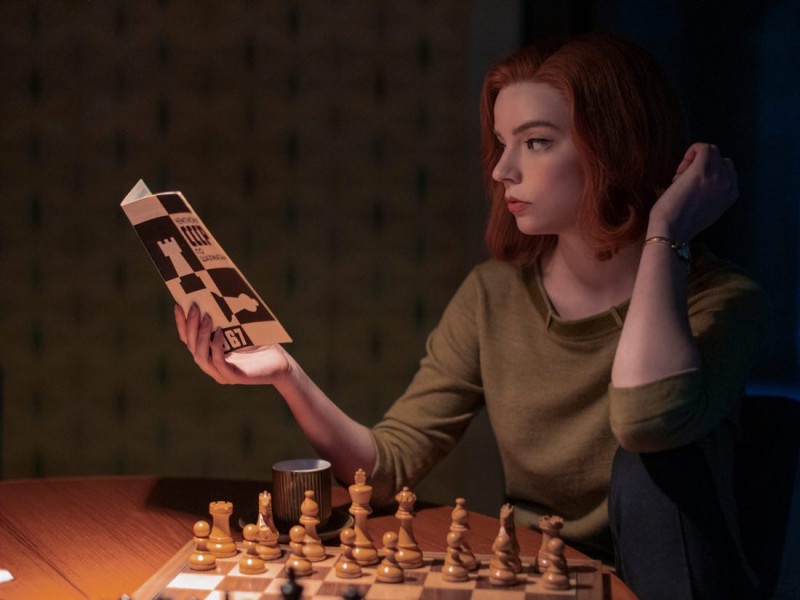 x
x
First two reviews are about the things that I like, now it’s time to talk about something I don’t like very much. To me, the Queen’s Gambit is very much overhyped, though with excellent performances and production value, lackluster character development and the lack of failure held this period piece back from being a classic.
The Queen Gambit is based on an 1983 novel written by Walter Tevis with the same name. The novel was rumored to be adapted into a movie by the late Heath Ledger, with Ellen Page (or Elliot now? I don’t know which name to use, help me.) as the lead. But that project came to a halt after Ledger’s unfortunate death in 2008. The adaptation was left untouched until 2019, where the writer of Logan and Minority Report, Scott Frank picked up the project and started working on adapting it into a six part mini series with rising star Anya Taylor-Joy attached to the project. The Queen’s Gambit was released in September last year to universal acclaim with various media and reviewers calling it the show of the year. Let me drop a hot take, I find the show to be frustratingly mediocre and it does not deserve the spot of show of the year.
The Queen’s Gambit is set in the late fifties and the early sixties, and it follows chess prodigy, Elizabeth Harmon(Anya Taylor-Joy)’s journey from struggling orphan to World Chess Champion and the emotional stress and alcohol and drug dependency thats comes with it.
What I feel like an important part of any show are plot and characters. World building and immersion is important, but it all means a little if the character development and plot are not good. I like character driven stories, that's why I love Scorsese, and I don’t like Nolan’s films as much as everyone does. Every Scorsese movie, if you put aside the violence, put aside the swearing, put aside all the narration, these stories are all primarily driven by character. Henry Hill, Jake La Motta, Jordan Belfort and Travis Bickle, they are all the driving force of the story. These stories feature much more compelling characters. These active protagonists are more defined and characterized than passive protagonists. They make things happen, instead of things happening to them. Let’s use another example, why the plot of TENET is so forgettable, because the characters are so poorly written, you don’t know much about any of them, what they are going for, what is their motivation for all of their action, why they are doing the things they did. All we see are emotionless puppets controlled by the puppet master, Christopher Nolan behind the scenes. When you see Jake La Motta, you don’t see Robert De Niro, you see Jake La Motta. When you see the Protagonist, you don’t see a character, you only see John David Washington acting, this is not a criticism on Washington, he did the most of what he was given, the script is just too plot driven, you don’t care about the characters, if you don’t care about the story, then you don’t care about the movie or show, if you don’t care about it , then why the hell are you seeing it?
The Queen’s Gambit is undoubtedly a plot driven show, and Beth Harmon is not an active protagonist. This makes the story unengaging as a result. Throughout the journey. Beth encountered a lot of obstacles. These moments are important for character growth and change, through adversity, we can see the true nature of a character and a person. However, Beth did not solve any, I mean any problem on her own. We won’t talk about problems she endured during her youth, as children require assistance to solve problems, it is normal. However, as she grows up, the lack of authority of her life is a serious problem to character progression. The most serious ones are after the series’ halfway point. Beth and her mother went to Mexico City to join the international chess tournament along with World Chess Champion, Russian Vasily Borgov. Borgov defeated Harmon in an intense affair, the first blemish in Beth’s stellar career. This was not the worst thing to happen though, Beth’s mother died after the match because of hepatitis. This launched Beth’s substance and alcohol abuse issue into a downward spiral out of control. This hardship is a key moment of character development, and it can be a defining moment of the character. She was helped by her friend, former Kentucky state chess champion, Harry Beitik. Fine, it's still the second act, maybe she will get his act together and solve some problems on her own. The greater problem starts with this, Beth didn’t approach Harry herself, Harry came to her to help her. Passive act, No.1. After Harry realized Beth was way too obsessed with chess and left her, another person came to her rescue. Benny Watts, former US Chess champion approached her and offered her mentorship, after Beth defeated her in a competition. Passive act No.2. Under Benny’s mentorship, she went to Paris to play against Borgov again. She relapsed and nearly missed the match, and in the end, she was handily defeated by Borgov. Beth’s drug and alcohol abuse problem became even more serious. What did Beth do to solve this problem? This was the third and final act and the penultimate episode, and this is a vital character moment if done well. But, nope, her friend Jolene just showed up and talked Beth out of the substance and alcohol abuse problem. Passive act No.3. Wait, this is not the worst. Do you know how Beth defeated Borgov? Her friends surprised her with detailed analyses of Borgov’s style and offered her a way to beat him. Beth followed her friend's guide and beat Borgov. Everything in this show just happens to Beth, she didn’t change anything. She did not cause anything to happen, she did not call her friends for help, she did not help herself. Beth Harmon is a typical example of a passive protagonist. It makes the story flimsy and unengaging, as you don’t know what the characters really are.
Being a passive protagonist is not the only problem of Beth Harmon’s character. Another main problem is that she did not change. The character does not change throughout the seven episodes. Beth Harmon started out as detached, not willing to ask others for help and obsessed with chess. Beth Harmon ends the series as detached, not willing to ask others for help and obsessed with chess. All of the moments I mentioned earlier can act as a moment of character growth. Through various hardships, the character is expected to grow and evolve. They should end up in a different position than before their journey starts. If your story is an upward arc, your character should emerge as a person with better characteristics, from the experiences they have. A classic case of an upward character arc is Luke Skywalker in A New Hope. If your story is a downward arc, the character should emerge with more negative character characteristics. Check out Breaking Bad if you want to see a downward character arc. You can also write a flat character arc, meaning the character does not become a better or a worse person, however, he or she may gain new knowledge, new skills or have a new perspective on the current events. A good example is Captain America: The Winter Soldier. The bottom line is, your character goes through change by enduring the challenges and events in the plots. This theory applies to all kinds of media and stories. From pure action games which don’t really have a story in Doom to character filled dramas like The Social Network, this storytelling applies to most above average stories. However, the Queen’s Gambit fails to do that. Everything was served to a silver platter for Beth. Her natural ability was the reason for her success, her adoptive parents’ support was the reason for her success, her friend’s unasked help was the reason for her success. Is Beth Harmon the person a reason for success or is it a detriment to her career? The Queen’s Gambit spends most of its time suggesting the latter. However, Beth comes out on top at the end without changing herself. The lack of consequences for the lack of character progression and the lack of changes, kills the story’s tension and makes it seem kind of pointless in the end.
Troubled genius stories have been done before, many times. I don’t hate cliched storytelling, I love Death Stranding although its story is pretty cliched. Any Given Sunday is my favourite sports movie although it is very cliched. The problem with the story and character of the Queen’s Gambit is not that they are cliched, it is that they are not executed well enough to justify investment into it.
The Queen’s Gambit has a lot of excellent elements. Anya Taylor-Joy’s performance is wonderful even if the script doesn’t give her a lot to work with, the supporting cast did a very good job as well. The ensemble cast is one of the best across television. The music by Carlos Rafael Rivera is brilliant and accompanies the seemingly boring chess scene very well. The set design and overall production is really well made as well, you really feel like you are in the US during the sixties, with a lot of soul in each and every set design, from the grim orphanage to the flashy and capitalistic Las Vegas Hotel, to classy and royal-like Moscow. Every single set is an artistic masterpiece that can be placed in a museum.
However, does it really matter? It does, of course. Or I should ask, can we enjoy all of this while they are in the backdrop of a subpar story? We still can but not as much as we want to. I would compare a TV series to a meal. The plot and characters for me are the main dish and the set design, production and acting are the appetizers, soup and dessert. Even if all the rest is excellent, if the main dish tastes like shit, then the meal still isn’t good, it can only be described as mediocre.
I really want to like this show, I really do. Hating something that everybody loves is incredibly hard. You would start doubting yourself. “Is it my problem that I don’t like this show? Is there something I don’t get so that I don’t think it is as enjoyable as everyone says?”
In a year which is really good for television, The Queen’s Gambit garnered 14 top 2 rank on major critics 2020 top 10 shows, with many excellent shows far lower than it, Ted Lasso, Schitt’s Creek, The Crown and a certain show which I will write about in my next TV review. You have to wonder, is it my mistake that I don’t like this show?
Media and entertainment are incredibly subjective. We all have different opinions about it. It is fine that you love the show. This is just my view, my review. Don’t let a random guy on the internet prevent you from enjoying the things you like. After all, everything is subjective. Live your life.
Next review: We are going to revisit the less than beautiful world of gambling.
ns 15.158.61.17da2





















